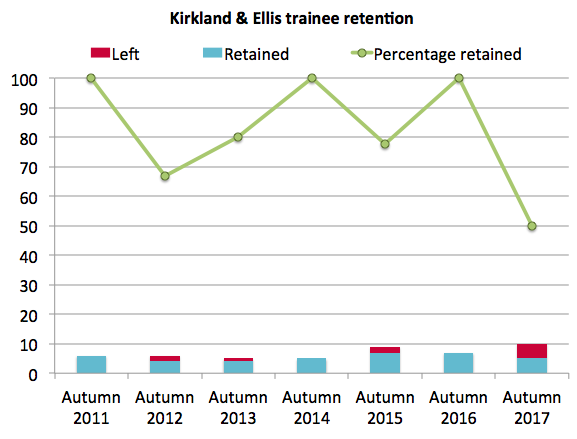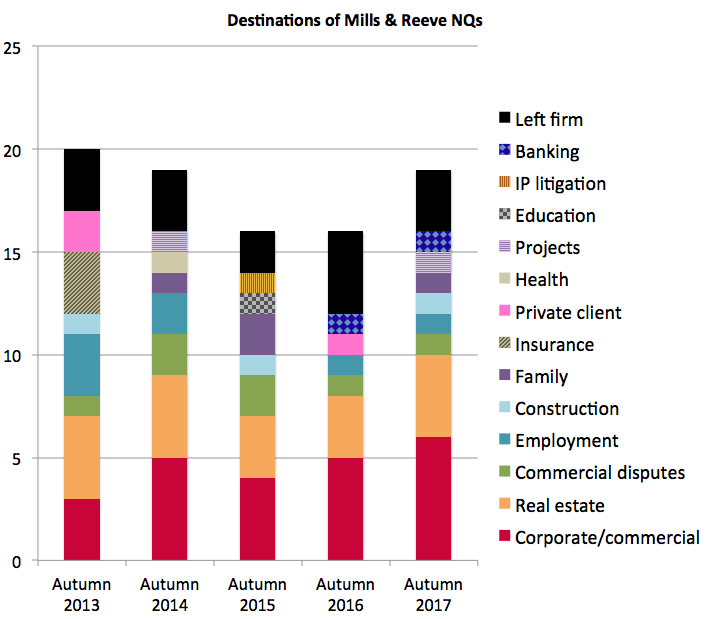Kirkland & Ellis has posted a 50 per cent retention rate for its trainees in the firm’s London office this year.
The Lawyer understands that the firm was over-subscribed on applications into its funds team while the firm itself was keen to find candidates to go into debt finance.
The firm currently offers 10 training contracts per year, with five set to remain at the firm as newly-qualified solicitors in September. It posted a 100 per cent retention rate in 2016 as all seven qualifiers who began in 2014 were kept on.

Meanwhile, Mishcon de Reya‘s retention is 64 per cent. The firm will keep nine of its 14 qualifiers, after posting 100 per cent retention last year.
National firm Mills & Reeve is holding on to 86 per cent of its qualifiers. Sixteen of 19 final seat trainees are staying on: eight in Cambridge, three in Norwich, two in London, two in Manchester and one in Birmingham. One is on a fixed-term contract.
Four NQs join Mills & Reeve’s real estate team, three go to corporate, another three to commercial, while the banking, construction, employment, family, projects and disputes teams all take one.

And at Royds Withy King, three out of four trainees have been retained: one in Bath, one in London and one in Swindon, joining the personal injury, commercial property and family teams. The firm also had three trainees who qualified in March, with one staying, one leaving and one staying on a fixed term contract, giving Withy King total 2017 retention of 71 per cent.
September trainee retention is now known at 16 firms, with Watson Farley & Williams revealing its results yesterday. Watson Farley is one of four firms that has posted 100 per cent retention so far, the others being
Kirkland was voted as London’s least liked law firm when 30 per cent of respondents in The Lawyer‘s Top 50 US Firms in London report named the firm has the least attractive to train in.
One respondent said the firm as has a “slave reputation” with another bluntly describing it as “mental”.
The firm’s offices were said to be “essentially workhouses run by robot partners” by another respondent.
However, Kirkland was praised for its financial services regulation reputation, ambition and salary packet.
US firms’ reputations for a high workload is well-publicised with 55 per cent of respondents saying they either strongly or slightly agreed when asked if US firms were like a sweatshop compared to the top UK firms.
That being said, 39 per cent strongly agreed the US firms were both as attractive to work at as UK firms, and more attractive than they were five years ago.
Last year, the firm upped its pay for UK associates to match those on its US pay scale, putting first-year on $180,000. This raise was the firm’s first since 2007 and took effect on 1 July 2016.
Kirkland & Ellis declined to comment.
| Autumn 2016 retention so far | Trainees retained | Fixed term contract | Trainees left | Total number of qualifiers | Percentage retained |
| Burges Salmon | 28 | 0 | 0 | 28 | 100 |
| Watson Farley & Williams | 15 | 0 | 0 | 15 | 100 |
| Walker Morris | 14 | 0 | 0 | 14 | 100 |
| Fieldfisher | 13 | 0 | 0 | 13 | 100 |
| Ashurst | 19 | 0 | 1 | 20 | 95 |
| Slaughter and May | 29 | 0 | 3 | 32 | 91 |
| Blake Morgan | 8 | 0 | 1 | 9 | 89 |
| Shearman & Sterling | 13 | 0 | 2 | 15 | 87 |
| Mills & Reeve | 15 | 1 | 3 | 19 | 84 |
| RPC | 14 | 0 | 3 | 17 | 82 |
| Mayer Brown | 8 | 0 | 3 | 11 | 73 |
| Withers | 8 | 0 | 3 | 11 | 73 |
| Royds Withy King | 4 | 1 | 2 | 7 | 71 |
| Trowers & Hamlins | 7 | 0 | 3 | 10 | 70 |
| Mishcon de Reya | 9 | 0 | 5 | 14 | 64 |
| Kirkland & Ellis | 5 | 0 | 5 | 10 | 50 |




























I think you can tell, by their website, how incredibly boring and robotic Kirkland is. I don’t think the pay packet would help to cover such an environment.